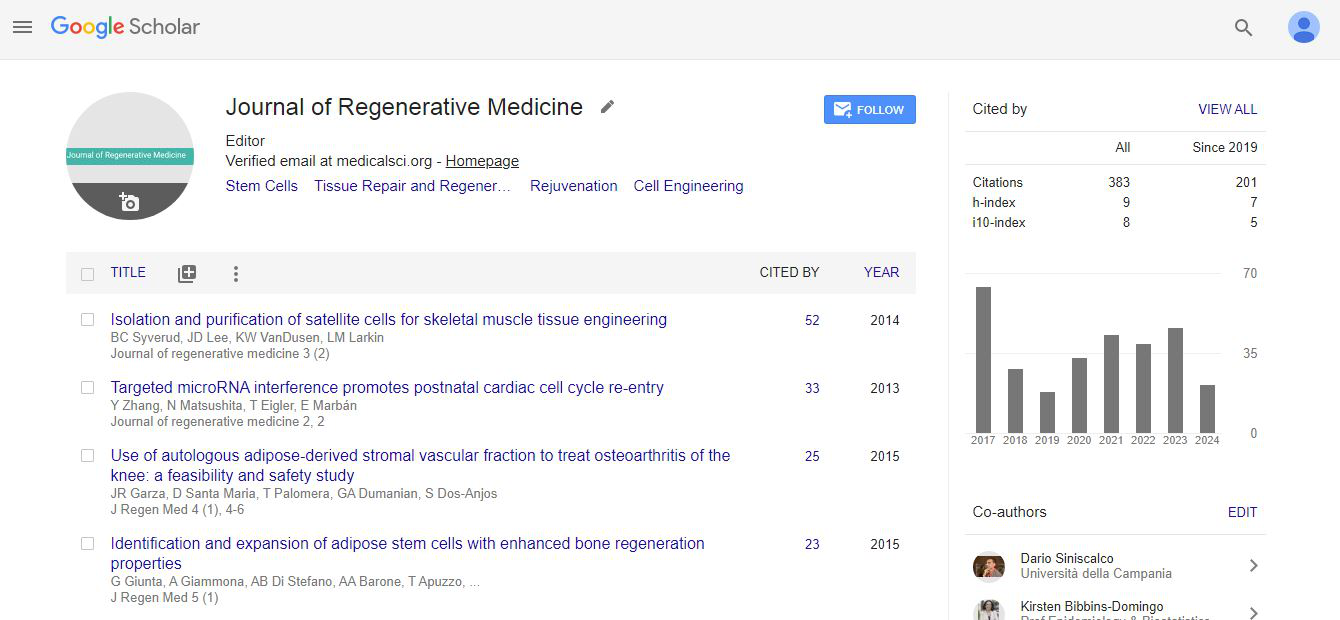The RNA profile of exosomes from MSCs during osteogenic differentiation
Wendy W Weston, Miguel Quevedo, Paul C Schiller and Timothy Ganey
VIVEX Biomedical, USA University of Miami Miller School of Medicine, USA
: J Regen Med
Abstract
The importance of exosome contribution to the success of MSC healing properties has recently become clear. It has been suggested that exosomes are responsible for paracrine signaling to themselves and neighboring cells, resulting in immune mediation, tissue repair and differentiation into a variety of cell types, depending on the parental cell, time of collection and neighboring environment. We are interested in discovering the RNA components of the abundant exosomes produced by MSCs as they transition to osteoprogenitors. It is intuitive that the RNA excreted by the exosomes will differ at various stages of differentiation. There is already good evidence that the RNA composition of exosomes from cultures varies between cells and over time. Importantly, we wish to know if the changes in exosome RNA correlates with the signals necessary to drive the differentiation process and if previously undiscovered stimulants are present. If either previous or latter are found, it is possible that the purified exosomes from MSC culture supernatant at specific stages would elicit specific results upon transplantation. We are utilizing MIAMI cells exposed to osteogenic media for 21 days. Supernatant from the cell cultures are collected at day 0, 2, 7, 14 and 21. Exosomes are isolated from the supernatant and RNA is isolated from the exosomes. RNASeq is performed utilizing the Ion Proton Next Generation Sequencer. The RNA content of exosomes from each time point are being compared for elucidation of which remain constant and which change during various stages of osteogenic differentiation.
Biography
Wendy Weston is currently the Staff Development Scientist at VIVEX Biomedical. She completed her Postdoctoral studies at Bruce W Carter VA Medical Center, GRECC researching isolation of specific MSCs known as MIAMI cells. She completed her Ph.D. from University of Miami, Miller School of Medicine in Molecular, Cell and Developmental Biology investigating the metastability of HSCs and the BM niche. She worked on bone formation and acceleration of fracture healing in the rat at Loma Linda VA and studied somatic gene therapy for muscle atrophy and B-MHC promoter activity following spinal cord isolation at Cal Poly, Pomona (MS Biological Sciences/Chemistry). Email: WWeston@med.miami.edu
 Spanish
Spanish  Chinese
Chinese  Russian
Russian  German
German  French
French  Japanese
Japanese  Portuguese
Portuguese  Hindi
Hindi 